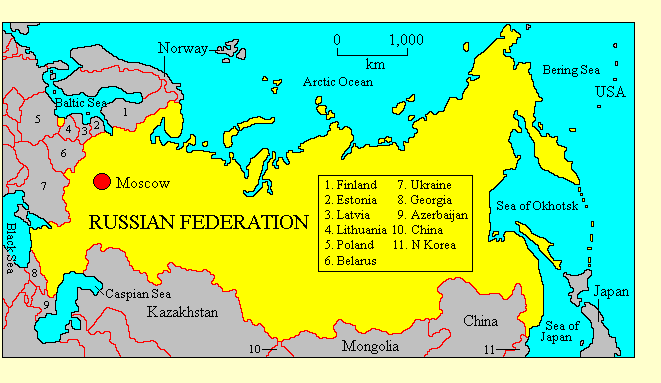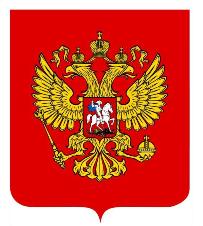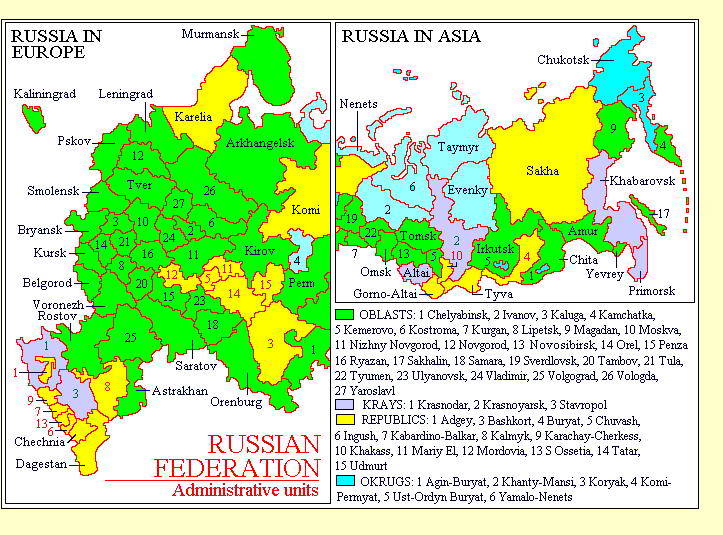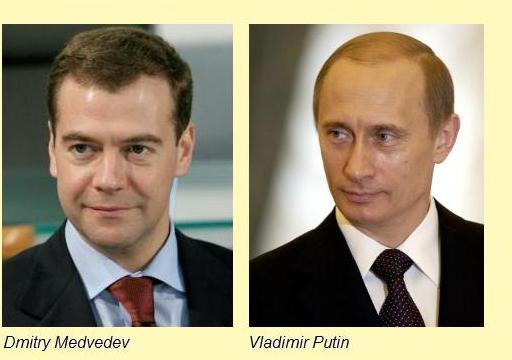
RUSSIAN FEDERATION
Official name: Rossiskaya Federatsia (Russian Federation)
• Location: Eastern Europe, North Asia
• International organisations: Asia-Pacific Economic Co-operation Forum, Commonwealth of Independent
States, Council of Europe, Group of Eight, Group of Twenty, Organisation for Security and Co-operation in Europe, United Nations
• Borders: Azerbaijan, Belarus, China, Estonia, Finland, Georgia,
Kazakhstan, Korea (DPRK), Latvia, Lithuania, Mongolia, Norway, Poland, Ukraine
• Coastline: Arctic Ocean, Baltic Sea, Bering Sea, Black Sea, Sea of Japan,Sea of Okhotsk
• Land area: 17,075,200 Km2

• Population: 141,900,000
• Annual GDP (PPP) per capita: US$15,100 (2009 CIA estimate). World ranking: 58
• Ethnicity: Russian 81.5%, Tatar 3.8%, Ukrainian 3.0%, Chuvash 1.2%,
Bashkir 0.9%, Belarusian 0.8%, Moldavian 0.7%, other 8.1%
• Languages: Russian is the official language and is almost universally
understood. Various minority languages have official status in the minority
republics.
• Religion: The great majority of the population are at least nominally
Russian Orthodox Christians. The Orthodox Church has semi-official status.
Islam, Othodox Judaism and Catholicism are also recognised, but other religions
face official obstruction.
• Form of government: In theory a presidential democracy, in practice a dictatorship. Despite its
official name Russia is not a true federation. It consists of Russia proper, divided into 49
oblasts (districts), and a number of Autonomous Republics, Krays and Okrugs, mostly ethnic enclaves in
the Caucusus and in the eastern part of the country, which enjoy some autonomy. Under Vladimir Putin
centralised control of all these entities has been greatly tightened.

• Capital: Moskva (Moscow)
• Constitution: The Russian Constitution
was adopted on 12 December 1993.
• Head of state: President, elected by direct universal suffrage for a four-year term. Under Vladimir Putin the President
was the effective head of the government, but since his shift to the prime ministership the
office has become secondary. From 2012 the President will be elected to a six-year term.
Dmitry Medvedev assumed office on
7 May 2008.
• Head of government: Prime Minister, appointed by the President. In theory
the Prime Minister is accountable to the legislature, but the weak party
system in that body means that in practice the Prime Minister holds office at
the pleasure of the President. (Since Vladimir Putin shifted from the presidency to the prime
ministership, this relationship has been reversed.)
• Legislature: The Federal Assembly (Federalnoye Sobraniye) is a bicameral
legislature. The lower house is the State Council
(Gosudarstvennaya Duma), which has
450 members elected for four-year terms (to be extended to five years from the next election).
Of these, 225 are elected by
proportional representation from party lists winning at least 5% of the vote,
and 225 are elected from single-member constituencies. The upper house is the
Federation Council (Soviet Federatsii), which has 178 members who are
appointed by the oblasts, republics and other administrative units.
• Electoral authority: The Central Election
Commission administers all national elections.
• Freedom House 2011 rating: Political Rights 6, Civil Liberties 5
• Transparency International Corruption Index: 21% (154 of 178 countries rated)
• Reporters Without Borders Press Freedom 2010 Index: 50.1% (140 of 178 countries rated)
• Heritage Foundation Economic Freedom 2010 Index: 50.5% (143 of 179 countries rated)
Political history
Russia was an absolute monarchy until the revolutionary events of 1905
forced Czar Nicholas II to grant a constitution, which provided for the
election of a Duma with a limited franchise. The Czar soon reneged on his
promises and the franchise for the Duma was further restricted, although it
continued to meet until 1917.
Following the first Russian Revolution in February 1917, elections for a
Constituent Assembly were scheduled for 1918 to devise a permanent democractic
constitution. In November 1917, however, the Communists seized power. The
elections went ahead, but the Assembly was dissolved by force and parties other
than the Communists were soon suppressed. Russia, as part of the Soviet Union
from 1921, was a one-party Communist dictatorship for 70 years.
Mikhail Gorbachev became leader of the Soviet Communist Party in 1985 and
embarked on a program of "perestroika" or restructuring. The first
semi-democratic election for the Supreme Soviet was held in 1989, but this served
only to hasten the
collapse of the system. Power passed to Boris Yeltsin, who was elected as
President of the Russian Republic within the Soviet Union in 1990. The Soviet
Union was dissolved at the end of 1991.

The new Russian constitution provided for a strong presidency and a weak
legislature on the French model. Yeltsin was elected for a five-year term in
1991 and re-elected in 1996, but resigned at the end of 1999. He was succeeded by
his Prime Minister, the former KGB officer Vladimir Putin, who was elected to a term in his own right in May 2000.
Putin concentrated power in his own hands and ensured that the media
was controlled by his supporters. His authoritarian tendencies were reinforced
by the legislature, which was dominated by Communists and reactionary
nationalists. By 2006 most observers had concluded that Putin had established a de facto dictatorship
and that Russia was no longer a democracy.
In 2008 Putin, having served the two terms permitted by the constitution, stood down as
President and arranged for the election of his supporter Dmitry Medvedev at the 2008
presidential election. Medvedev then appointed Putin as Prime Minister, from which post he
continues to rule as a virtual dictator. Both the 2007 legislative election and the 2008
presidential election were widely regarded as fraudulent. At the presidential elections in 2012,
Putin will re-assume the presidency.
The weakness of the Duma prevented the formation of strong political
parties after 1991. The dominant party is now Putin's
United Russia (ER), best understood as the heir of the Communist Party as a
ruling party of state rather than as a democratic party designed to compete for office at free
elections. Neither the Communist
Party of the Russian Federation, an unreconstructed Communist Party, nor Vladimir Zhirinovsky's
so-called Liberal-Democratic Party, which represents
extreme Russian nationalism, are serious rivals for power.
The only other serious party is the populist Fair Russia.
Parties genuinely representing democratic values have been squeezed out of existence.
Freedom House's 2011
report on Russia
says: "Russia is not an electoral democracy. The 2007 State Duma elections were carefully
engineered by the administration, handing pro-Kremlin parties a supermajority in the lower house,
which is powerless in practice. In the 2008 presidential election, state dominance of the media
was on full display, debate was absent, and incumbent Vladimir Putin was able to pass the office
to his handpicked successor, Dmitry Medvedev... Corruption in the government and business world is
pervasive. A growing lack of accountability within the government enables bureaucrats to act with
impunity... Although the constitution provides for freedom of speech, the authorities continue to
put pressure on the dwindling number of critical media outlets. Since 2003, the government has
controlled, directly or through state-owned companies, all of the national television networks.
Only a handful of radio stations and publications with limited audiences offer a wide range of
viewpoints... The government has consistently reduced the space for freedoms of assembly and
association... The judiciary lacks independence from the executive branch, in part because judges
are often dependent on court chairmen for promotions and bonuses, and must follow Kremlin
preferences in order to advance."
Updated November 2011
|


